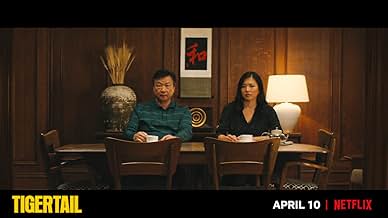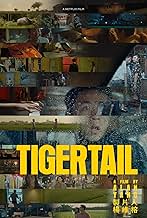AVALIAÇÃO DA IMDb
6,6/10
4 mil
SUA AVALIAÇÃO
O operário de uma fábrica de Taiwan deixa sua terra para buscar oportunidades nos Estados Unidos, onde luta para encontrar conexão, equilibrando responsabilidades novas e familiares neste dr... Ler tudoO operário de uma fábrica de Taiwan deixa sua terra para buscar oportunidades nos Estados Unidos, onde luta para encontrar conexão, equilibrando responsabilidades novas e familiares neste drama de várias gerações.O operário de uma fábrica de Taiwan deixa sua terra para buscar oportunidades nos Estados Unidos, onde luta para encontrar conexão, equilibrando responsabilidades novas e familiares neste drama de várias gerações.
- Direção
- Roteirista
- Artistas
- Prêmios
- 2 vitórias e 1 indicação no total
Queenie Yu-Hsin Fang
- Young Yuan
- (as Yo-Hsing Fang)
Kuei-Mei Yang
- Minghua
- (as Yang Kuei-Mei)
Lynn Masako Cheng
- Child Angela
- (as Lynn Cheng)
Che-Hao Chang
- Kuomintang Soldier #1
- (as Che Hao Chang)
Avaliações em destaque
In director Alan Yang's Emmy winning speech for Master of None in 2016, he said that despite there being 17 million Asian-Americans in this country, there was still a lack of representation in television and film. Tigertail is undoubtedly a step towards that direction.
Set over four different time periods across both Taiwan and New York, Tigertail is an immigrant story at heart. When Pin-Jui (played by Tzi Ma) is still a teenager, he reluctantly enters into an arranged marriage as a means to provide money for his ailing mother. He leaves behind his girlfriend and emigrates to New York. After a few years, Pin-Jui and his wife have a daughter of their own, of whom Pin-Jui has a fractured relationship.
From one angle, this immigrant story is formulaic. Parents, with nothing in common, struggle in a foreign land for the sake of their children. But from another angle, Yang shows us nuances and subtleties that demand a deeper inspection. The miniature piano that Pin-Jui scavenges for his wife but remains unplayed over the years. Pin-Jui repeatedly opening and closing the metal gate to his small grocery store through the seasons, showing the passage of time. Pin-Jui's daughter crying in the backseat after being scolded after a piano recital gone wrong.
One nuance that reverberates throughout the film is language. The film features three different languages: English, Mandarin Chinese, and Taiwanese Hokkien. Each language represents a different generation: Pin-Jui's mother exclusively speaks Taiwanese, Pin-Jui primarily speaks Chinese, and Pin-Jui's daughter speaks English. For the entire film, all of the dialogue between Pin-Jui and his daughter is in English. It's not until her father brings her to where he grew up and finally tells her the story of his upbringing: How he gave up his life for another. It's only here, in the final moments of the film where she speaks Chinese for the first time and asks, "What was her name?"
Covering four different time periods in the span of a mere ninety minutes was an ambitious task, and for that reason, the movie feels particularly rushed. Perhaps more attention could have been placed on capturing the relationship between the father and daughter: This has always been a core piece of what it means to be a child of immigrants. Furthermore, the stitching of scenes across different time periods don't always translate well to Pin-Jui's character development as an adult. It's only until the final fifteen minutes of the film do you see this unfold.
Overall, Yang is able to capture the right emotions in his directorial debut and tells a classic story in his own way. The subtleties, reflecting both an Asian-American heritage and relatable familial scenes establish a fulfilling level of depth to the film. True to his own words, you can't help but wonder what Yang will do next.
Set over four different time periods across both Taiwan and New York, Tigertail is an immigrant story at heart. When Pin-Jui (played by Tzi Ma) is still a teenager, he reluctantly enters into an arranged marriage as a means to provide money for his ailing mother. He leaves behind his girlfriend and emigrates to New York. After a few years, Pin-Jui and his wife have a daughter of their own, of whom Pin-Jui has a fractured relationship.
From one angle, this immigrant story is formulaic. Parents, with nothing in common, struggle in a foreign land for the sake of their children. But from another angle, Yang shows us nuances and subtleties that demand a deeper inspection. The miniature piano that Pin-Jui scavenges for his wife but remains unplayed over the years. Pin-Jui repeatedly opening and closing the metal gate to his small grocery store through the seasons, showing the passage of time. Pin-Jui's daughter crying in the backseat after being scolded after a piano recital gone wrong.
One nuance that reverberates throughout the film is language. The film features three different languages: English, Mandarin Chinese, and Taiwanese Hokkien. Each language represents a different generation: Pin-Jui's mother exclusively speaks Taiwanese, Pin-Jui primarily speaks Chinese, and Pin-Jui's daughter speaks English. For the entire film, all of the dialogue between Pin-Jui and his daughter is in English. It's not until her father brings her to where he grew up and finally tells her the story of his upbringing: How he gave up his life for another. It's only here, in the final moments of the film where she speaks Chinese for the first time and asks, "What was her name?"
Covering four different time periods in the span of a mere ninety minutes was an ambitious task, and for that reason, the movie feels particularly rushed. Perhaps more attention could have been placed on capturing the relationship between the father and daughter: This has always been a core piece of what it means to be a child of immigrants. Furthermore, the stitching of scenes across different time periods don't always translate well to Pin-Jui's character development as an adult. It's only until the final fifteen minutes of the film do you see this unfold.
Overall, Yang is able to capture the right emotions in his directorial debut and tells a classic story in his own way. The subtleties, reflecting both an Asian-American heritage and relatable familial scenes establish a fulfilling level of depth to the film. True to his own words, you can't help but wonder what Yang will do next.
"Tigertail" is one of the better films I've seen lately. A moving yet quiet film that offers viewers a look inside immigrant life.
.
In this drama, a Taiwanese factory worker leaves his homeland to seek opportunity in America, where he struggles to find connection while balancing family and newfound responsibilities.
.
I found this film to be more compelling and resonant than 2019's "The Farewell". "Tigertail" had my full attention from the start until the very bittersweet end. You get to see a completely other side of writer/director Alan Yang ("Master Of None") and he leaves filmmaker imprints as he goes along. The performances in this film are great as well; the iconic Tzi Ma ("The Farewell", "Arrival") really gets to show off his acting chops here playing a quiet but struggling man. You feel his pain and conflict throughout. I didn't think I'd enjoy "Tigertail" as much as I did and I think you should definitely stream it on Netflix.
.
Follow @snobmedia for more reviews!
That closing shot.
As a story about someone letting it all kinda get away from them (themselves, their desires, their ability to connect emotionally) not due to some significant event but just through their everyday decisions and the passage of time, it's pretty depressing. But also funny and beautiful at times.
It made me real sad despite having no connection to the material or the immigrant experience.
As a story about someone letting it all kinda get away from them (themselves, their desires, their ability to connect emotionally) not due to some significant event but just through their everyday decisions and the passage of time, it's pretty depressing. But also funny and beautiful at times.
It made me real sad despite having no connection to the material or the immigrant experience.
A movie about people from Taiwan who came to US after they are in their twenties, however, the cast was picked of actors mostly from mainland China and USA.
Watching them speaking mandarin as Taiwanese with strong mainland accent; or speaking perfect native English as an aged Taiwanese is just unreal.
The director should simply hire Taiwanese cast to shoot the film.
Writer-director Alan Yang has absorbed the full measure of auteur Wong Kar Wai, whose lovingly intimate In the Mood for Love is my litmus test for modern Asian cinema at its best. Although Netflix's Tigertail may be more realistic than Mood, it captures a middle-aged Ping Jui (Tzi Ma) romanticizing his past as he struggles to connect with his estranged daughter, Angela (Christine Ko) in the present.
Do not look to this drama for an eye-popping American love story, for it is Asian in its restraint and its lyrical understatement. After facing deep disappointment as an immigrant to America with his arranged wife, handsome Ping adjusts to the realities of life and the boredom of his marriage.
Salving his despair are the images of his former love, Yuan (Joan Chen), whom he left to go to America on his factory boss's dime and with the boss's daughter as bride. Although American romances often end with a pleasant alignment, Yang does not indulge us on such fantasies.
Tigertail smacks us with the vagaries of immigration, not the thorny process the news underlines today but rather the disappointment an immigrant might experience as he watches his American dream collapse under the weight of a reality check that includes substandard housing and menial jobs.
The latter part of Tigertail is about the glacial change that comes to Ping after his mom dies, his wife leaves him, and he must try to connect with Angela, unaccustomed as he is to saying anything much of anything to her. His Asian paternalism and cold restraint make communication challenging.
The painful reunion is the strength of the film: Most of us have at least one family member we should reach out to, but we may lack the willingness or interpersonal skills. Yet, those skills can come slowly but surely as we face them to overcome them.
Tigertail is a small drama filled with humanity, superior acting, and enviable cinematography. John Ford would be happy to see how Yang honors him with a final shot that recalls the famous frame shot in The Searchers. Tzi is no John Wayne, but they share characters with a remoteness that plagues cultures and families for all times.
As we struggle with the pandemic's demand for social distancing, Tigertail shows the effects of it in everyday real life.
Do not look to this drama for an eye-popping American love story, for it is Asian in its restraint and its lyrical understatement. After facing deep disappointment as an immigrant to America with his arranged wife, handsome Ping adjusts to the realities of life and the boredom of his marriage.
Salving his despair are the images of his former love, Yuan (Joan Chen), whom he left to go to America on his factory boss's dime and with the boss's daughter as bride. Although American romances often end with a pleasant alignment, Yang does not indulge us on such fantasies.
Tigertail smacks us with the vagaries of immigration, not the thorny process the news underlines today but rather the disappointment an immigrant might experience as he watches his American dream collapse under the weight of a reality check that includes substandard housing and menial jobs.
The latter part of Tigertail is about the glacial change that comes to Ping after his mom dies, his wife leaves him, and he must try to connect with Angela, unaccustomed as he is to saying anything much of anything to her. His Asian paternalism and cold restraint make communication challenging.
The painful reunion is the strength of the film: Most of us have at least one family member we should reach out to, but we may lack the willingness or interpersonal skills. Yet, those skills can come slowly but surely as we face them to overcome them.
Tigertail is a small drama filled with humanity, superior acting, and enviable cinematography. John Ford would be happy to see how Yang honors him with a final shot that recalls the famous frame shot in The Searchers. Tzi is no John Wayne, but they share characters with a remoteness that plagues cultures and families for all times.
As we struggle with the pandemic's demand for social distancing, Tigertail shows the effects of it in everyday real life.
The 'Tigertail' Cast Name Their Asian Cinema Picks
The 'Tigertail' Cast Name Their Asian Cinema Picks
Tigertail writer/director Alan Yang is joined by stars Tzi Ma and Christine Ko to name some of their favorite films for you to check out in Asian Cinema.
Você sabia?
- CuriosidadesAll of the flashback scenes were shot on 16mm film while all the present day scenes were shot on digital.
Principais escolhas
Faça login para avaliar e ver a lista de recomendações personalizadas
- How long is Tigertail?Fornecido pela Alexa
Detalhes
- Data de lançamento
- País de origem
- Central de atendimento oficial
- Idiomas
- Também conhecido como
- Hổ Vĩ
- Empresas de produção
- Consulte mais créditos da empresa na IMDbPro
- Tempo de duração1 hora 31 minutos
- Cor
- Proporção
- 2.39 : 1
Contribua para esta página
Sugerir uma alteração ou adicionar conteúdo ausente







































